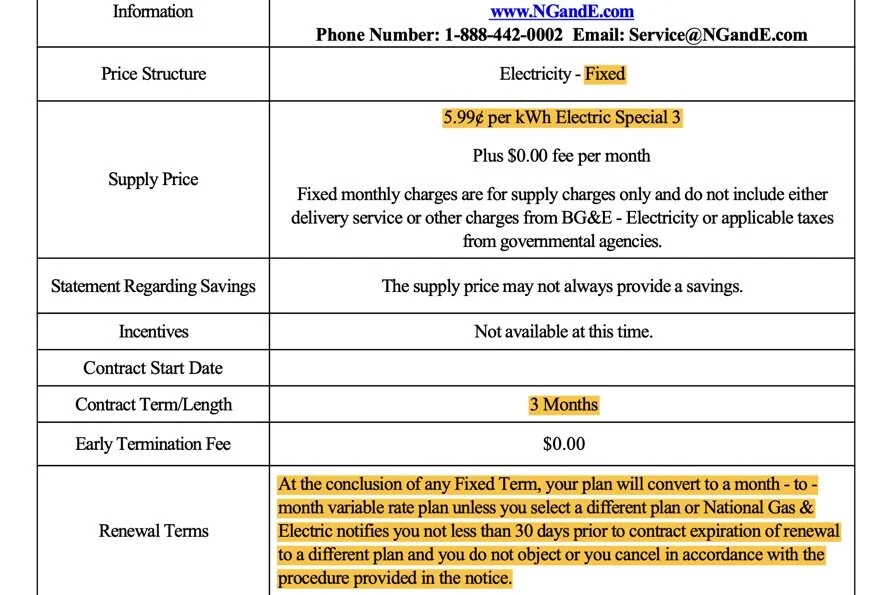Grab Your Bill. Are you saving or losing?
Here are 6 steps to figure out for yourself.
Pennies matter: Avg. households uses 10,000 kilowatt hours electricity / year.
Quarters matter: Homes in colder climates use about 800 therms of gas / year.
1. The difference between utility delivery and supply?
14 states & DC deregulated their home energy markets. Everyone has to open an account with their local regulated utility for power. Everyone is charged “delivery” or “distribution” charges that pay for the poles, wires, lines, service, & outages.
Consumers do not make decisions about delivery charges. State public utility commissions regulate these costs.
2. What’s deregulated supply?
Consumers in deregulated states can choose between their regulated utility supply, or an alternate third-party energy supplier.
Energy supply is the price families pay for how much electricity and natural gas a household used for a billing cycle. Deregulation means people have the option to choose an alternative energy supplier for electricity & gas.
If consumers don’t switch their utility supply, the local utility is the default energy supplier.
Deregulated third-party suppliers charge a price for each kilowatt hour of electricity and each therm of gas, and often fees, and suppliers sometimes throw in rewards.
3. Compare your rates: Regulated Utility vs. Deregulated Supplier
Don’t fret - few people can decipher their energy bills. Grab your bill. Watch this how-to-read-bill video below, even if you’re not in Maryland’s BGE territory. The video gives you the clues you need to figure out your utility bill. Or, call your utility, and have the agent explain how to read your bill. If you want to cancel your energy supplier, you call the supplier, not your utility. Check your bill each month to make sure your account is enrolled with the supplier you chose.
In MD, here are the two price web sites to check rates, but be aware these sites only market advertised initial rates, not the suppliers’ eventual variable rates.
4. What to do if supplier enrollment wasn’t authorized by account holder.
If you’re 100% sure you never signed up at a store, a theater, the airport, a mailer, or over the phone, look up your state’s Public Service Commission web site and file a consumer complaint. If you win your case, you may get a rebate for any over charges you paid. Stay on top of this complaint, don’t give up, if you don’t agree with supplier’s response, write the PSC group.
5. How-to-Read-Your-Bill Videos & Brochures
Even if you’re not in the BGE territory, you will learn the steps needed to do the simple math to learn if you’re saving or losing with your energy suppliers.
How To Read Your BGE Bill YouTube
How To Read BGE - brochure
How to Read BGE - Spanish version brochure.
6. Do you Know you have a Supplier Contract?
When you enroll with a deregulated energy supplier using an e-tablet sign-up, over the phone or by mail, you enter into a binding “official” business contract.
The most commonly used contract type is below. The “gotcha” is the renewal which is buried in the terms. All contracts automatically convert to variable rates where suppliers can charge any price they can dream up.
Fixed rate to variable Rate Contract: A widely used contract that begins with an introductory rate, a teaser rate, or even a fixed rate for 2-24 months, where the starting price is usually less than the utility’s price. The price seems competitive, especially if a gift card is offered at purchase.
Once the “teaser rate,” or the initial fixed month term ends, the pricing converts to variable rates with no price maximum. Variable rate contracts are legally “terminable at will,” meaning you can exit anytime. Because this change is spelled out in the contract (buried in the contract), no consumer notification is required.
Fixed rate contracts consumers will get a renewal letter in the mail before the contract ends, many miss this letter, or don’t realize they need to call in and re-negotiate pricing. Fixed rate contracts also include early termination fees, which are usually $10 for each month left in contract.
In Maryland, these contracts, the auto-renewals, the termination fees, the pricing with no caps, and fees and surcharges are legal.
Renewal rates are unknown:
This is WGL’s renewal a subsidiary of the regulated gas Washington Gas. Tricky renewal terms because customer must wait for letter at end of the initial period, read it, understand and take action. This renewal term of “we will tell you later, hope you catch it” is being used more often.
A 7-minute video may be worth your time.
Urban myth has it that Americans spend a total of 8 minutes a year checking out their monthly utility bills. Not really exciting, but a big expense each month. Especially if you haven’t compared your deregulated rats to your regulated rates.


